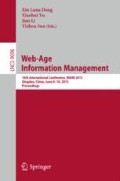Abstract
Most knowledge bases (KBs) can hardly be kept up-to-date due to time-consuming manual maintenance. Cumulative Citation Recommendation (CCR) is a task to address this problem, whose objective is to filter relevant documents from a chronological stream corpus and then recommend them as candidate citations with certain relevance estimation to target entities in KBs. The challenge of CCR is how to accurately category the candidate documents into different relevance levels, since the boundaries between them are vague under the current definitions. To figure out the boundaries more precisely, we explore three types of relevance evidences including entities’ profiles, existing citations in KBs, and temporal signals, to supplement the definitions of relevance levels. Under the guidance of the refined definitions, we incorporate these evidences into classification and learning to rank approaches and evaluate their performance on TREC-KBA-2013 dataset. The experimental results show that all these approaches outperform the corresponding baselines. Our analysis also reveals various significances of these evidences in estimating relevance levels.
This work was partially done when the first author was visiting Microsoft Research.
Access this chapter
Tax calculation will be finalised at checkout
Purchases are for personal use only
Preview
Unable to display preview. Download preview PDF.
References
Balog, K., Ramampiaro, H.: Cumulative citation recommendation: classification vs. ranking. In: SIGIR 2013, pp. 941–944. ACM (2013)
Balog, K., Ramampiaro, H., Takhirov, N., Nørvåg, K.: Multi-step classification approaches to cumulative citation recommendation. In: OAIR 2013, pp. 121–128 (2013)
Berendsen, R., Meij, E., Odijk, D., Rijke, M.d., Weerkamp, W.: The university of amsterdam at trec 2012. In: TREC (2012)
Bonnefoy, L., Bouvier, V., Bellot, P.: A weakly-supervised detection of entity central documents in a stream. In: SIGIR 2013, pp. 769–772 (2013)
Bunescu, R., Pasca, M.: Using encyclopedic knowledge for named entity disambiguation. In: EACL 2006, pp. 9–16 (2006)
Cucerzan, S.: Large-scale named entity disambiguation based on Wikipedia data. In: EMNLP-CoNLL. pp. 708–716. Association for Computational Linguistics, Prague, June 2007
Dietz, L., Dalton, J., Balog, K.: Umass at trec 2013 knowledge base acceleration track. In: TREC (2013)
Frank, J.R., Kleiman-Weiner, M., Roberts, D.A., Niu, F., Zhang, C., Re, C., Soboroff, I.: Building an Entity-Centric Stream Filtering Test Collection for TREC 2012. In: TREC 2012 (2012)
Frank, J., Bauer, S.J., Kleiman-Weiner, M., Roberts, D.A., Triouraneni, N., Zhang, C., Rè, C.: Evaluating stream filtering for entity profile updates for trec 2013. In: TREC (2013)
Gross, O., Doucet, A., Toivonen, H.: Named entity filtering based on concept association graphs. CICLing (2013)
Han, X., Zhao, J.: Named entity disambiguation by leveraging wikipedia semantic knowledge. In: CIKM 2009, pp. 215–224 (2009)
Kjersten, B., McNamee, P.: The hltcoe approach to the trec 2012 kba track. In: TREC 2012 (2012)
Liu, X., Darko, J., Fang, H.: A related entity based approach for knowledge base acceleration. In: TREC (2013)
Mihalcea, R., Csomai, A.: Wikify!: linking documents to encyclopedic knowledge. In: CIKM, pp. 233–242. ACM (2007)
Robertson, S., Soboroff, I.: The trec 2002 filtering track report. In: TREC (2002)
Vlachos, M., Meek, C., Vagena, Z., Gunopulos, D.: Identifying similarities, periodicities and bursts for online search queries. In: SIGMOD, pp. 131–142. ACM (2004)
Wang, J., Song, D., Lin, C.Y., Liao, L.: Bit and msra at trec kba ccr track 2013. In: TREC (2013)
Zhou, M., Chang, K.C.C.: Entity-centric document filtering: boosting feature mapping through meta-features. In: CIKM, pp. 119–128. ACM (2013)
Author information
Authors and Affiliations
Corresponding author
Editor information
Editors and Affiliations
Rights and permissions
Copyright information
© 2015 Springer International Publishing Switzerland
About this paper
Cite this paper
Wang, J., Liao, L., Song, D., Ma, L., Lin, CY., Rui, Y. (2015). Resorting Relevance Evidences to Cumulative Citation Recommendation for Knowledge Base Acceleration. In: Dong, X., Yu, X., Li, J., Sun, Y. (eds) Web-Age Information Management. WAIM 2015. Lecture Notes in Computer Science(), vol 9098. Springer, Cham. https://doi.org/10.1007/978-3-319-21042-1_14
Download citation
DOI: https://doi.org/10.1007/978-3-319-21042-1_14
Published:
Publisher Name: Springer, Cham
Print ISBN: 978-3-319-21041-4
Online ISBN: 978-3-319-21042-1
eBook Packages: Computer ScienceComputer Science (R0)

